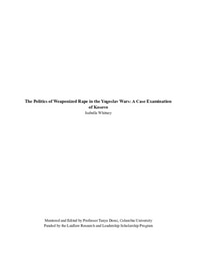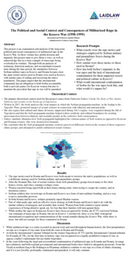Leadership-in-Action: Introduction
I spent my second summer as a Laidlaw Scholar interning with the Global Survivors Fund, a nonprofit organization based in Geneva that works to make reparations for conflict-related sexual violence (CRSV) available to survivors worldwide. Founded by joint Nobel Peace Prize winners Dr. Denis Mukwege and Nadia Murad in 2018, the organization operates at both a macro and micro level, creating reparations programs in specific communities while also working with the United Nations and other international bodies on legal measures related to reparations.
Interning at this organization was the perfect conclusion to my work from the last summer. When researching conflict-related sexual violence during the Kosovo War and its longstanding legal and social implications, I found myself struggling with questions about how to move forward. Part of my reasoning for pursuing this field in the first place was the lack of attention and understanding paid to it by the international community. I found myself falling into the same trap I had spent the past several years condemning – overwhelming pessimism and hopelessness in the face of overwhelmingly negative data.
This is, of course, only the clinical explanation. Another reason I chose to pursue this work were the gaps and problems in so much of the already-existing feminist literature. Inspired by the work of Rana Jaleel at UC Davis, I came to realize that the definition of rape and sexual violence is more fluid than what international law currently outlines, and how these definitions are problematic. This debate is especially complicated when it is situated in Chandra Mohanty’s work, remembering the importance “a feminism fully engaged with the realities of a transnational world.” Tragically, one thing that unifies women across the globe is rape and sexual violence’s presence as a threat, and that every survivor is entitled to reparative measures.
Working on reparations for survivors is the remedy to pessimism in this field. It forces researchers to both thoroughly understand the problem while analyzing a myriad of factors to consider solutions. It allows activists and academics alike to be able to honestly say that they both view the subject with academic integrity and ethically advocate for a survivor-centric solution.
The survivor-centric approach is key to GSF’s mission. Rather than creating frameworks for reparative measures that are enforced in every community we work with, we create and enforce reparative measures with survivors in each community. Survivors of CRSV are not a monolith, and each case of CRSV is unique, both from person to person, and community to community. We let survivors take the lead on our projects, listening to their stories and creating reparative measures with their input and approval tailored to their needs. For reparations to be effective in 2023, and for this project to be truly global and universal, it cannot be uniform.
Contextual variance is not the enemy of universalism, but it’s best advocate. GSF argues that the right to reparations is universal, not that reparations should be uniform across all cases. This is in direct response to the critical arguments made by so many feminists and human rights advocates who rightly point out that so much of feminism and women’s human rights’ original theories and ideas (which are unfortunately still widespread) are predicated on paternalistic, neocolonial prejudices and fantasies about “saving” women in non-Western contexts.


Please sign in
If you are a registered user on Laidlaw Scholars Network, please sign in